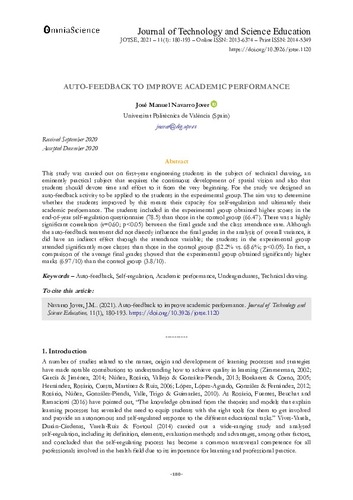Auto-feedback to improve academic performance

Visualitza/Obre
Cita com:
hdl:2117/345610
Tipus de documentArticle
Data publicació2021-04
EditorOmniaScience
Condicions d'accésAccés obert
Llevat que s'hi indiqui el contrari, els
continguts d'aquesta obra estan subjectes a la llicència de Creative Commons
:
Reconeixement-NoComercial 4.0 Internacional
Abstract
This study was carried out on first-year engineering students in the subject of technical drawing, aneminently practical subject that requires the continuous development of spatial vision and also thatstudents should devote time and effort to it from the very beginning. For the study we designed anauto-feedback activity to be applied to the students in the experimental group. The aim was to determinewhether the students improved by this means their capacity for self-regulation and ultimately theiracademic performance. The students included in the experimental group obtained higher scores in theend-of-year self-regulation questionnaire (78.5) than those in the control group (66.47). There was a highlysignificant correlation (r=0.60; p<0.05) between the final grade and the class attendance rate. Althoughthe auto-feedback treatment did not directly influence the final grades in the analysis of overall variance, itdid have an indirect effect through the attendance variable; the students in the experimental groupattended significantly more classes than those in the control group (82.2% vs. 68.6%; p<0.05). In fact, acomparison of the average final grades showed that the experimental group obtained significantly highermarks (6.97/10) than the control group (3.8/10)
CitacióNavarro Jover, J.M. Auto-feedback to improve academic performance. "JOTSE: Journal of Technology and Science Education", Abril 2021, vol. 11, núm. 1, p. 180-193.
Dipòsit legalB-2000-2012
ISSN2013-6374
| Fitxers | Descripció | Mida | Format | Visualitza |
|---|---|---|---|---|
| 1120-4589-1-PB.pdf | 517,2Kb | Visualitza/Obre |


